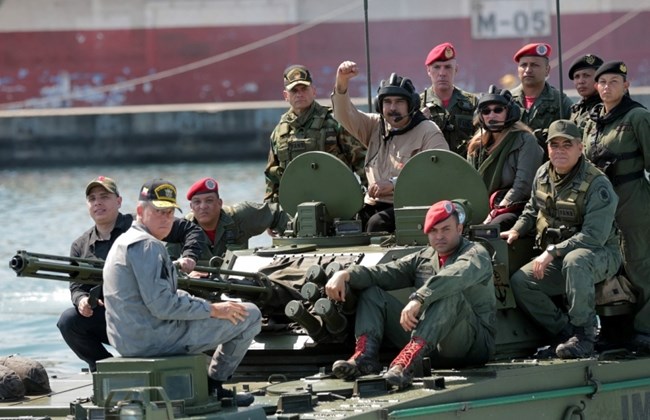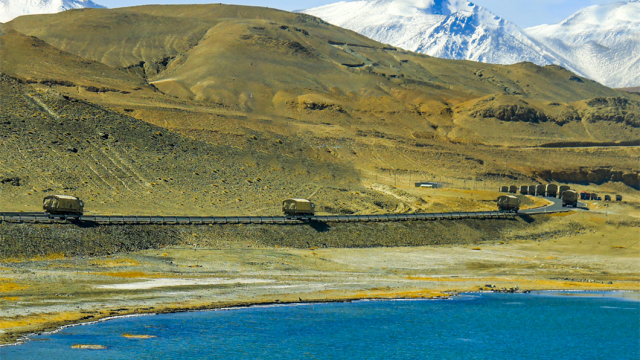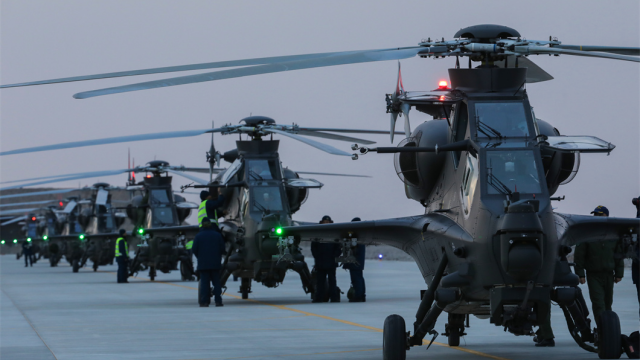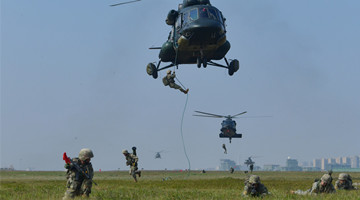By Zhang Wenwen and Hua Bin

Maduro and his wife Cilia Flores sit atop a military vehicle during a military exercise in Venezuela’s Puerto Cabello. Miraflores Palace/Handout via REUTERS
Recently, the continuing turbulence in Venezuela has become a focus of attention for the international community.
Venezuela held military exercises from February 10 to 15 named the “200th anniversary of the Angostura - 2019,” the country's most large-scale military drills ever. It is considered Venezuela's stern response of to the threat of the US military intervention.
Russia, a supporter of the Maduro administration, warned the US against its military interference in Venezuela’s internal affairs, saying that it will definitely violate the international law and principles of the UN Charter. Meanwhile, Russia declared that it is ready to mediate Venezuelan crisis.
What behind the “wrestling” between the US and Russia is their contention for strategic interests in Venezuela. A British media outlet commented, “The fate of Maduro has been inevitably thrust into a wider geopolitical game between the US and Russia.”
For Russia, Venezuela is a pivotal point in its Latin America strategy. From the strategic perspective, Venezuela is one of the few Latin American countries upholding a stance against the US, thus, supporting Venezuela is favorable for Russia to gain an edge in its geopolitical wrestling with the US. From the economic perspective, Venezuela is a major oil producer, and Russia-Venezuela cooperation in oil and natural gas is helpful for Russia to control oil prices and take the lead in international economic competitions. From the military perspective, Venezuela is an important importer of Russian weapons. Maintaining good relationship with this traditional client will not only provide a profitable market for Russia’s military industry, but also add a military ally of Russia.
For the US, Venezuela is regarded as its “backyard” because of the geographical location adjacent to the Caribbean. Since the Monroe period, the US has considered Venezuela part of its 'strategic depth' and endeavored to foster pro-American forces in the country. Moreover, Venezuela is the world’s largest holder of proven oil reserves. Intervening in Venezuela’s oil sector will undoubtedly gain an edge for the US in its competition with OPEC and Russia for the pricing power in the international energy market, thus solidifying the petrodollar system.
In general, the situation in Venezuela faces uncertain future. On the one hand, the US military intervention has yet to be approved by the US Congress, and most Americans tend to not use armed forces to solve the Venezuelan crisis. In addition, the US military intervention in other countries’ internal affairs will violate the spirit of the UN Charter and relevant principles of the international law. On the other hand, it is also unlikely that Russia dispatches troops to Venezuela, as Russia just breathed a sigh of relief from the Syrian battlefield, it may hardly have the ability to intervene in Venezuela.
Moreover, other Latin American countries are actively making mediation, in hope of creating an opportunity for political settlement of the Venezuelan crisis. And in terms of the Maduro administration, it still leaves some leeway though taking a tough stance against the pressure from Western countries. The administration declared that it is willing to dialogue with domestic opposition groups.
Nevertheless, it is doubtless that resorting to force cannot solve the Venezuelan crisis, because that will only make things more complicated and worse. Only when involved parties carry out inclusive dialogue can the Venezuelan impasse be resolved.









